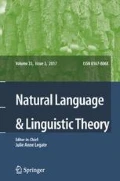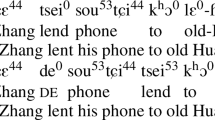Abstract
This paper addresses the compositionality puzzle presented by a class of ‘pseudo-resultative’ predicates, such as tight in the sentence She braided her hair tight. The analysis proposed reveals that the modification involved also provides insight into the nature of the lexical roots of verbs and their role in compositional semantics. Pseudo-resultative predicates superficially resemble resultative secondary predicates and resultative adverbs. However, it is shown that they do not modify any ‘word’ in the syntax. Rather, these predicates modify the root of the verb in a configuration which is licensed by the semantic type of the root and the structure of root creation verbs. The modification of such roots provides evidence that they are syntactically active, as proposed in the framework of Distributed Morphology (Halle and Marantz 1993; Marantz 1997; Arad 2003). It is shown that the roots are syntactically well-behaved and can be modified just like other ‘larger’ constituents. Syntactic parallels between the root creation verbs which license pseudo-resultative predicates and other structures further provide evidence for a syntactic decomposition of these verbs whereby the object is related to the root in a prepositional structure in a manner reminiscent of proposals for other classes of verbs in Hale and Keyser (1993, 2002).
Similar content being viewed by others
References
Ameka, Felix K. 1995. The linguistic construction of space in Ewe. Cognitive Linguistics 6: 139–181.
Arad, Maya. 2003. Locality constraints on the interpretation of roots: the case of Hebrew denominal verbs. Natural Language & Linguistic Theory 21: 737–778.
Bittner, Maria. 1999. Concealed causatives. Natural Language Semantics 7: 1–78.
Carrier, Jill, and Janet H. Randall. 1992. The argument structure and syntactic structure of resultatives. Linguistic Inquiry 23: 173–234.
Chomsky, Noam. 1995. The minimalist program. Cambridge: MIT Press.
Chomsky, Noam. 2000. Minimalist inquiries: the framework. In Step by step: essays on minimalist syntax in honor of Howard Lasnik, eds. Martin Roger, David Michaels, and Juan Uriagereka, 89–156. Cambridge: MIT Press.
Chomsky, Noam. 2001. Beyond explanatory adequacy. In MIT occasional papers in linguistics, Vol. 20. Cambridge: MIT, Working Papers in Linguistics.
Clark, Eve V., and Herbert H. Clark. 1979. When nouns surface as verbs. Language 55: 767–811.
Davidson, Donald. 1967. The logical form of action sentences. In The logic of decision and action, ed. Nicholas Rescher. Pittsburgh: University of Pittsburgh Press.
Dowty, David. 1979. Word meaning and Montague Grammar: the semantics of verbs and times in generative semantics. Dordrecht: Reidel.
Fong, Vivienne. 2001. ‘Into doing something’: where is the path in event predicates? Paper presented at the ESSLLI 2000 workshop on paths and telicity in event structure, University of Birmingham, 7–11 August, 2000.
Geuder, Wilhelm. 2000. Oriented adverbs: issues in the lexical semantics of event adverbs. Doctoral Dissertation, Universität Tübingen.
Grimshaw, Jane. 2005 [1993]. Semantic structure and semantic content in lexical representation. In Words and structure. Stanford: CSLI Publications.
Hale, Kenneth, and Samuel Jay Keyser. 1993. On argument structure and the lexical expression of syntactic relations. In The view from building 20: essays in honor of Sylvain Bromberger, eds. Kenneth Hale and Samuel Jay Keyser, 53–110. Cambridge: MIT Press.
Hale, Kenneth, and Samuel Jay Keyser. 2002. Prolegomenon to a theory of argument structure. Cambridge: MIT Press.
Halle, Morris, and Alec Marantz. 1993. Distributed morphology and the pieces of inflection. In The view from building 20: essays in honor of Sylvain Bromberger, eds. Kenneth Hale and Samuel Jay Keyser, 111–176. Cambridge: MIT Press.
Harley, Heidi. 2002. Possession and the double object construction. In Vol. 2 of Yearbook of linguistic variation, eds. Pierre Pica and Johan Rooryck. Amsterdam: John Benjamins.
Harley, Heidi. 2005. How do verbs get their names? Denominal verbs, manner incorporation, and the ontology of verb roots in English. In The syntax of aspect, eds. Nomi Erteschik-Shir and Tova Rapoport. Oxford: Oxford University Press.
Hoekstra, Teun. 1988. Small clause results. Lingua 74: 101–139.
Horrocks, Geoffrey, and Melita Stavrou. 2003. Actions and their results in Greek and English: the complementarity of morphologically encoded (viewpoint) aspect and syntactic resultative predication. Journal of Semantics 20: 297–327.
Jackendoff, Ray. 1990. Semantic structures. Cambridge: MIT Press.
Karlsson, Fred. 1999. Finnish: an essential grammar. London: Routledge.
Kayne, Richard S. 1985. Principles of particle constructions. In Grammatical representation, eds. Jacqueline Guéron, Hans-Georg Obenauer, and Jean-Yves Pollock, 101–140. Dordrecht: Foris.
Kester, Ellen-Petra. 1996. The nature of adjectival inflection. Doctoral Dissertation, Utrecht University.
Kiparsky, Paul. 1997. Remarks on denominal verbs. In Argument structure, eds. Alex Alsina, Joan Bresnan, and Peter Sells, Stanford: CSLI.
Kracht, Marcus. 2002. On the semantics of locatives. Linguistics & Philosophy 25: 157–232.
Kratzer, Angelika. 1996. Severing the external argument from its verb. In Phrase structure and the lexicon, eds. Johan Rooryck and Laurie Zaring, 109–137. Dordrecht: Kluwer.
Kratzer, Angelika. 2005. Building resultatives. In Event arguments in syntax, semantics, and discourse, eds. Claudia Maienborn and Angelika Wöllenstein-Leisten, 177–212. Tübingen: Niemeyer.
Levin, Beth. 1993. English verb classes and alternations: a preliminary investigation. Chicago: University of Chicago Press.
Levin, Beth, and Malka Rappaport-Hovav. 1995. Unaccusativity: at the syntax-lexical semantics interface. Cambridge: MIT Press.
Levinson, Lisa. 2007. The roots of verbs. Doctoral Dissertation, New York University.
Marantz, Alec. 1997. No escape from syntax: don’t try morphological analysis in the privacy of your own lexicon. In Proceedings of the 21st annual Penn linguistics colloquium, eds. Alexis Dimitriadis, Laura Siegel, Clarissa Surek-Clark, and Alexander Williams, 201–225. Philadelphia: University of Pennsylvania, Working Papers in Linguistics.
Marantz, Alec. 2005. Objects out of the lexicon! Argument-structure in the syntax. Handout, University of Connecticut Linguistics Colloquium, April 2005.
Mateu, Jaume. 2000. Why can’t we wipe the slate clean? A lexical-syntactic approach to resultative constructions. Catalan Working Papers in Linguistics 8: 71–95.
Napoli, Donna J.. 1992. Secondary resultative predicates in Italian. Journal of Linguistics 28: 53–90.
Nunberg, Geoffrey. 1995. Transfers of meaning. Journal of Semantics 12: 109–132.
Parsons, Terence. 1990. Events in the semantics of English. Cambridge: MIT Press.
Pesetsky, David. 1995. Zero syntax: experiencers and cascades. Cambridge: MIT Press.
Pinker, Stephen. 1989. Learnability and cognition: the acquisition of argument structure. Cambridge: MIT Press.
Pylkkänen, Liina. 2002. Introducing arguments. Doctoral Dissertation, MIT.
Rappaport Hovav, Malka, and Beth Levin. 1998. Building verb meaning. In The projection of arguments: lexical and compositional factors, eds. Miriam Butt and Wilhelm Geuder, 97–134. Stanford: CSLI.
Sadler, Louisa, and Douglas J. Arnold. 1994. Prenominal adjectives and the phrasal/lexical distinction. Journal of Linguistics 30: 187–226.
Simpson, Jane. 1983. Resultatives. In Papers in lexical-functional grammar, eds. Lori Levin, Malka Rappaport, and Annie Zaenen, 143–158. Bloomington: Indiana University Linguistics Club.
Talmy, Leonard. 1991. Paths to realization: a typology of event integration. In Vol. 91 of Buffalo working papers in linguistics, 147–187. Buffalo: SUNY Buffalo Linguistics.
Tenny, Carol. 2000. Core events and adverbial modification. In Events as grammatical objects: the converging perspectives of lexical semantics and syntax, eds. Carol Tenny and James Pustejovsky. Stanford: Center for the Study of Language and Information.
Washio, Ryuichi. 1997. Resultatives, compositionality and language variation. Journal of East Asian Linguistics 6: 1–49.
Wechsler, Stephen. 2005. Resultatives under the event-argument homomorphism model of telicity. In The syntax of aspect, eds. Nomi Erteschik-Shir and Tova Rapoport. Oxford: Oxford University Press.
Wheeler, Max W., Alan Yates, and Nicholas Dols. 1999. Catalan: a comprehensive grammar. London/New York: Routledge.
Zhang, Niina Ning. 2002. Movement within a spatial phrase. In Perspectives on prepositions, eds. Hubert Cuyckens and Günter Radden, 47–63. Tübingen: Niemeyer.
Author information
Authors and Affiliations
Corresponding author
Rights and permissions
About this article
Cite this article
Levinson, L. Arguments for pseudo-resultative predicates. Nat Lang Linguist Theory 28, 135–182 (2010). https://doi.org/10.1007/s11049-010-9089-x
Received:
Accepted:
Published:
Issue Date:
DOI: https://doi.org/10.1007/s11049-010-9089-x




